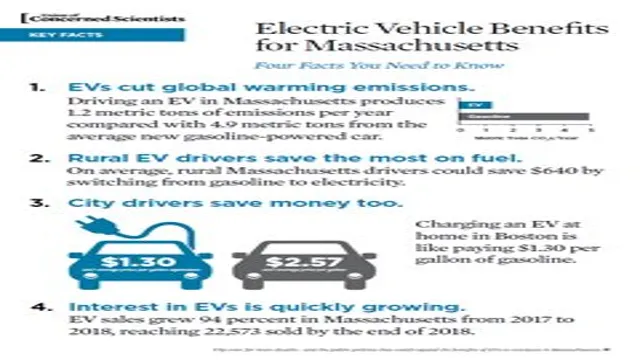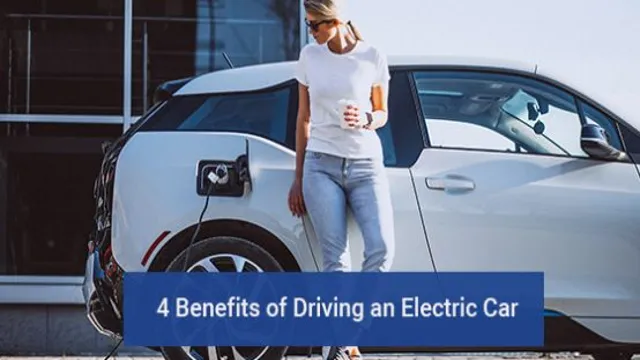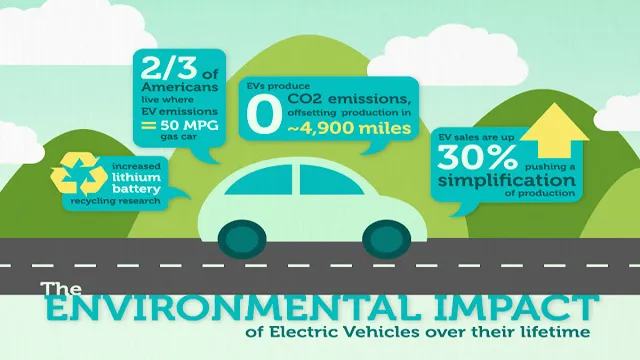Unleashing the Power: The Top Performance Benefits of Electric Cars
Electric cars have been around for a while now, and as technology evolves, so do their capabilities. One of the biggest misconceptions about electric cars is that they lack the performance benefits of traditional gas-powered cars. However, this couldn’t be further from the truth.
In fact, electric cars offer a plethora of performance advantages that are just waiting to be unlocked. Not only are they highly efficient and environmentally friendly, but they also offer a smooth and quiet ride that can’t be matched by traditional cars. With instant torque and fast acceleration, electric cars can outperform their gas-guzzling counterparts in many ways.
So, how exactly are electric cars unlocking performance benefits? Let’s take a closer look.
Electric Motors vs Combustion Engines
Electric cars have been gaining popularity in recent years due to the numerous performance benefits they offer over traditional combustion engines. Electric motors have a much simpler design and fewer moving parts compared to combustion engines, resulting in less maintenance and fewer opportunities for something to go wrong. Additionally, electric cars offer instant torque, which means they can accelerate quickly and smoothly, providing a more enjoyable driving experience.
Furthermore, electric cars emit zero emissions, making them more environmentally friendly than traditional cars, as they do not contribute to air pollution. Finally, electric cars are also quieter and smoother, providing a more serene driving experience. With all these benefits, it is no wonder that electric cars are becoming the future of the automotive industry.
Efficiency Comparison: Data and Examples
When it comes to comparing the efficiency of electric motors versus combustion engines, there are a few key things to consider. First, electric motors have the advantage of being able to convert a higher percentage of the energy they consume into useful work. While combustion engines typically only convert around 30% of the energy in their fuel into power that can be used to move a vehicle or machinery, electric motors can achieve efficiencies of up to 95%.
Plus, electric motors don’t produce the same emissions as combustion engines, making them a cleaner option overall. However, it’s worth noting that the efficiency of electric motors can depend on a few factors. For example, the type of battery being used can affect how much energy is lost during charging and discharging.
Additionally, the way an electric motor is designed can impact its efficiency, as well as the way it’s used. For example, if an electric motor is frequently run at low speeds or under heavy loads, it may not be as efficient as one that’s designed for those specific conditions. Overall, though, the efficiency of electric motors is hard to beat when compared to combustion engines.
As more advances are made in battery technology and motor design, it’s likely that electric motors will continue to become even more efficient and versatile. Ultimately, the choice between using an electric motor or a combustion engine will depend on the specific needs of the application and the resources available to invest in the technology.

Instantaneous Torque: Explained with Examples
Electric Motors vs Combustion Engines Instantaneous torque is an essential aspect to consider when comparing electric motors and combustion engines. In an electric motor, torque is produced immediately due to the design of the motor and the way it generates power. This instantaneous torque means that when you press the accelerator in an electric car, you get immediate power, making it ideal for high-performance applications.
On the other hand, a combustion engine takes time to produce the torque needed for acceleration. The process of combustion, with fuel and air entering the engine and being ignited by a spark plug, takes time to complete before the engine can generate torque. This delay in torque production can be felt by drivers in slower acceleration times and reduced responsiveness when you press the accelerator.
To illustrate the difference, imagine two cars at a red light. One car is powered by an electric motor, and the other is powered by a combustion engine. When the light turns green, the electric car will immediately surge forward with its full power, while the combustion engine will need time to build up the torque required to reach a similar speed.
While electric cars offer immediate torque and quick acceleration, there are still benefits to combustion engines, including longer driving range and the ability to refuel quickly. However, as technology continues to improve, electric cars are becoming a more viable option for everyday use, with more models offering longer ranges and faster charging times.
Battery Technology and Its Impact on Performance
Electric cars have continued to gain popularity due to their performance benefits as compared to gasoline-fueled cars. The batteries used in electric cars have a significant impact on their performance. More powerful and efficient batteries provide longer ranges and quicker acceleration, resulting in better performance.
Tesla, the leading electric car manufacturer, uses advanced lithium-ion batteries with improved energy density to power their cars. The batteries’ increased energy density has improved performance, enabling electric cars to achieve higher speeds and travel longer distances. The use of regenerative braking technology, which converts the energy that would be wasted during braking to recharge the battery, also contributes to the improved performance of these vehicles.
As battery technology continues to advance, electric cars’ performance benefits will continue to soar, making them a more attractive option for car buyers seeking superior performance, reduced fuel costs, and environmental sustainability.
Energy Density Comparison: Lithium-ion vs Gasoline
Battery Technology and Its Impact on Performance Battery technology has come a long way from the old days of bulky, heavy batteries that provided limited power. Today’s energy-dense batteries, like lithium-ion, are revolutionizing the way we power everything from our phones to our cars. While traditional gasoline engines have a high energy density, meaning they can produce a great amount of energy per unit of volume or weight, lithium-ion batteries have a higher energy density, making them a more efficient and cleaner alternative to gasoline.
For example, a lithium-ion battery can hold more energy per unit of weight than gasoline, making them ideal for use in electric vehicles. Additionally, they produce zero emissions, making them not only more efficient but also better for the environment. As battery technology continues to improve, we can expect to see even more significant changes in performance and efficiency across a range of industries.
Reduced Weight and Improved Handling: Real World Impact
As battery technology continues to advance, we’re seeing some exciting developments in the world of reduced weight and improved handling. For instance, with lithium-ion batteries, we’re able to use much lighter materials without sacrificing performance. This means that electric vehicles can be lighter and more agile, making them easier to handle and more fun to drive.
Additionally, advances in battery management systems are allowing for more precise control over power delivery, which can improve acceleration and make electric vehicles feel more responsive and engaging. Overall, these developments are making a real difference in the performance of electric vehicles, and we can expect to see even more exciting innovations in the years to come.
Battery Management Systems: Optimizing Range and Power
Battery Management Systems (BMS) As electric vehicles continue to increase in popularity, battery technology and the management of these batteries become more critical. Battery Management Systems (BMS) are essential to optimizing the range and power of EVs. They not only monitor the battery’s state of charge and power output but also protect the battery from overcharging or discharging, which could result in battery damage.
BMS can also help to extend the life of the battery and increase the vehicle’s overall performance. By adjusting factors such as temperature control, energy regeneration, and charging rates, BMS can maximize the battery’s efficiency and provide the most range possible. The effectiveness of the BMS ultimately impacts the overall performance of the vehicle.
Therefore, EV manufacturers must prioritize BMS development and maintenance to ensure that they continue to provide customers with superior performance, efficiency, and range.
Future of Electric Car Performance
Electric cars have come a long way since being introduced to the market. One of the biggest benefits of electric car performance is that they provide smoother and instantaneous power delivery, improving acceleration and torque over traditional gasoline-powered vehicles. As battery technology continues to evolve, their performance and range capabilities have significantly improved.
Electric cars also offer better efficiency since they don’t have to constantly burn fuel for energy. They can be charged using renewable energy sources, leading to lower greenhouse gas emissions. Overall, electric car performance benefits are undeniable and have the potential to revolutionize the automotive industry.
As more people adopt these vehicles, we can expect to see even more advancements and improvements in electric car performance.
Advancements in Motor and Battery Technology
The future of electric car performance is looking brighter than ever, thanks to the advancements in motor and battery technology. One of the most exciting developments is the rise of electric motors with higher power output and efficiency, allowing for faster acceleration and better overall performance. At the same time, batteries are becoming more powerful and longer-lasting, making it possible for electric cars to travel further on a single charge.
These improvements are also leading to reduced charging times, making electric cars more practical for longer journeys. One of the most exciting things about the future of electric car performance is the sheer amount of innovation happening across the industry. Some companies are exploring new battery chemistries and materials, which could lead to even more significant improvements in performance and range.
Others are developing new ways to cool electric motors, which can enable even faster acceleration without overheating. As electric cars become more mainstream, we can expect to see even more exciting developments that push the envelope of what’s possible. Despite all the progress that’s been made, there’s still a long way to go before electric cars can truly compete with their gas-powered counterparts.
But with each new technological breakthrough, that day gets closer and closer. And as consumers continue to demand more sustainable and environmentally-friendly transportation options, there’s no doubt that electric cars will play an increasingly important role in shaping the future of mobility.
Recuperative Braking and Regenerative Energy: Future Possibilities
Recuperative Braking and Regenerative Energy are part of the future possibilities that will improve the performance of electric cars. Recuperative Braking is the process of converting kinetic energy into electrical energy that charges the battery of an electric car. Unlike traditional cars, electric cars will utilize braking energy instead of wasting it.
This feature is expected to add some range to electric vehicles and make them more efficient. Regenerative Energy, on the other hand, will enable the car to generate power from renewable energy sources, such as solar or wind. This idea, combined with recuperative braking, would make electric cars more independent and sustainable.
Imagine driving an electric car that is powered by energy from the sun and wind, and the energy used for braking is also captured to give back to the vehicle. In conclusion, Recuperative Braking and Regenerative Energy are futuristic features that will affect the performance of electric cars positively. They showcase the direction of sustainable transportation and energy storage.
Final Thoughts: Are Electric Cars the Future of Performance?
It’s no secret that electric cars are becoming more popular by the day. From the Tesla Model S to the Nissan Leaf, these vehicles are quickly becoming a favorite among eco-conscious drivers and enthusiasts alike. But are they the future of performance? The answer may surprise you.
While gas-powered cars have traditionally been considered the top performers on the road, electric cars are quickly catching up. Thanks to advancements in battery technology and electric motors, these vehicles are capable of incredible acceleration and speed. In fact, the instant torque and quiet operation of electric cars give them a distinct advantage over their gas-powered counterparts.
Plus, with zero emissions and lower operating costs, owning an electric car can also be a smart financial choice. So, will electric cars replace gas-powered cars in the world of performance? Only time will tell, but one thing is certain – the benefits of electric cars are impossible to ignore.
Conclusion
In conclusion, the benefits of electric cars’ performance are truly shocking. With lightning-fast acceleration, silent operation, and regenerative braking, electric cars offer a thrilling driving experience unlike any other. Not to mention, their environmentally-friendly nature and cost-effective maintenance make them an electric choice for any modern driver.
So why choose to run on fossil fuels when you can charge up on clean, electric power and spark a new era of automotive technology?”
FAQs
How does the performance of electric cars compare to traditional gas-powered cars?
Electric cars have excellent torque and acceleration, providing quick and smooth acceleration from a stop. They are also incredibly quiet and have a far lower center of gravity than gasoline cars, resulting in responsive handling and a fun-to-drive experience.
Do electric cars offer any fuel efficiency advantages over gas-powered cars?
Yes, electric cars are much more efficient than gas-powered cars. While gasoline engines only convert around 20% of the energy stored in fuel into forward motion, electric motors use nearly 100% of the energy stored in their battery packs. This efficiency means that electric cars can travel much farther on a single “tank” of “fuel” than a gas-powered car can.
Are electric cars more environmentally friendly than traditional cars?
Yes, electric cars produce zero tailpipe emissions, meaning they do not release any harmful pollutants into the air. Additionally, electric car owners can significantly reduce their carbon footprint if they charge their vehicles using renewable energy sources like wind or solar power.
What is the maintenance like for electric cars?
Electric cars require less maintenance than traditional gas-powered cars because they have fewer moving parts. They do not have a gas engine, transmission, spark plugs, muffler, or catalytic converter, all of which are common components in a gas-powered car. Some electric cars are also designed with regenerative braking, which means the car slows down by using the motor to generate electricity, and this not only helps to slow down the car but also recharges the battery.



